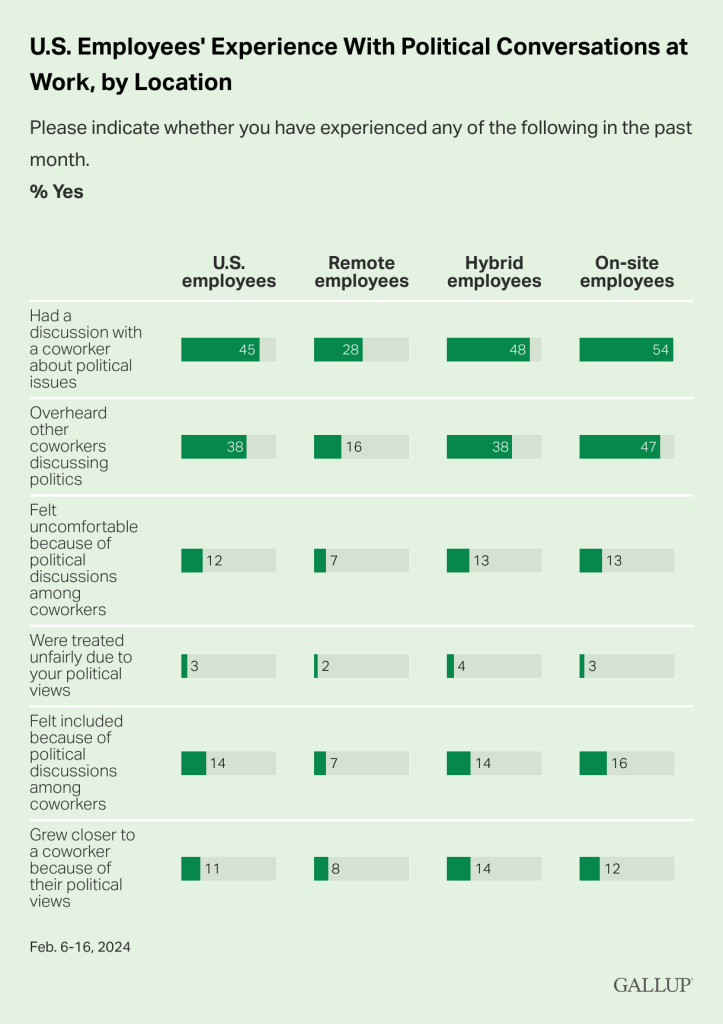What Every Communicator Must Consider During this Heated Election Season

Have you heard? The 2024 election season is upon us!
Democratically and positively, all Americans have the opportunity to make our voices heard as we go to the polls in November. Good or bad, to aid in our decision making, our democratic norms of late have all of us exposed to years-long campaigning, billion-dollar ad budgets and multiple rallies, speeches and conventions. As communications leaders and avid consumers of news/information, it seems like we cannot get away from the constant barrage of political news and social media discourse.
Add to that the fact that some experts say that political polarization is high…and rising. With elections, comes heightened emotions, strong views on the issues facing our nation and the strong possibility for in-office political conversations that, frankly, could take your team away from your business goals and disrupt a positive work environment.
It’s important that we don’t ignore the internal communications challenges (or opportunities) this season poses, even if we would like to tune out the constant news, commentator opinions and rebuttals.
Political Discussions in the Workplace – Positive or Negative?
As communicators you may have concerns about managing political discussions in the workplace. You are not alone. According to a 2024 report by law firm Littler, 87% of employers expressed concern with managing divisive political and social beliefs among their employees leading up to the election.
Gallup finds that political discussions at work appear to have both positive and negative effects on employees. Consider these findings:
- 14% of employees say having political discussions with coworkers has helped them feel included
- 11% say they have grown closer to a coworker because of their political views
- 12% say political conversations at work have made them feel uncomfortable
- 3% report being treated unfairly for their views.

Do these Gallup results have you thinking? Are political discussions in the workplace good? Bad? Somewhere in between? Can communications leaders even squelch political discussion in the workplace? The answer is not an easy yes or no. And there are a lot of issues to consider.
A collection of advice around workplace political discussions include:
- Establish a policy around political speech/activity at work. And periodically remind your team members of the rules.
- Emphasize a culture of respect and inclusion. Many team members may have friends and relatives who may be personally affected by some of the hot button issues in this election cycle. Their personal experiences need to be acknowledged and respected.
- Remind employees that the workplace is where everyone should feel safe, welcomed, and included.
The following post touches on four issues around politics in the workplace, the right to vote and the benefits of supporting democracy, all timely issues of importance communicators should consider during an election season.
Do the Research: Employment and Labor Laws are in Play
As Littler points out in its article, there are a myriad of labor and employment law issues that arise with politics in the workplace, including antidiscrimination laws, the National Labor Relations Act, state mandatory employer-sponsored meetings bans and voting leave laws. It behooves communications professionals to take time to meet with your organization’s legal counsel to understand the laws that are pertinent to your business in your particular state.
Of note: the country’s First Amendment right to free speech isn’t protected in most private companies, it only protects us against government retribution. Littler notes that it does not provide a constitutional right for workers to express political thoughts or opinions in a private workspace. Yet, some states and municipalities do protect employee’s rights to political expression and their right to express political opinions. It’s worth repeating that a discussion with your legal counsel on the laws for your particular situation is imperative.
Support Democracy: Make it Easy for Your Employees to Vote
While it is assumed that most employers give employees time off to vote, it is not mandated federally. In fact, Wyrick Robbins reports that 23 states and the District of Columbia have laws requiring employers to provide their employees with a period of paid time off on election day, generally between one and three hours, in order to vote. Seven states mandate unpaid time off. But twenty states have no requirement at all. (Author’s note: sources across the internet vary on specific state information relating to these laws; double check the laws in the state/s in which your business operates.)
Even if not mandated, a company benefits from opening its doors to let employees freely exercise their right to vote. According to Barracuda, when employees feel supported in their ability to participate in the democratic process, it can lead to higher job satisfaction, improved morale, and a stronger sense of community within the workplace.
Going Further to Support Democracy Pays Dividends
There is a growing number of employers who go above and beyond these time-off-to-vote laws and see value in rallying its employees and encouraging them to vote or even take on issues of importance. According to Gallup, Americans are divided about whether businesses should take a public stance on political and social issues, with 48% believing they should and 52% saying they should not. Divided, but not by a long margin.
Younger adults are more likely than older adults to believe businesses should take a stance: 59% of those aged 18 to 29 think as much, compared with 51% of those aged 30 to 44, 41% of those aged 45 to 59, and 43% of those aged 60 and older.

Some companies are out in front on issues around democracy and voting. As reported in the Harvard Business Review, for a number of years, Patagonia has led a charge to fight voter apathy by supporting a ‘When the polls open, we close” campaign. And the response was overwhelmingly positive.
Expanding on this, Patagonia teamed up with PayPal and Levi Strauss to encourage more businesses to participate in the movement. The result? 400 businesses participated and the company has plans for an early voting campaign this year too.
A study of the business benefits of corporate-sponsored voter turnout campaigns concluded there are many. Those benefits include:
- meeting consumer expectations for engagement in social and political issues
- raising brand awareness with new audiences
- increasing employee satisfaction.
Food for thought for communicators.
Supporting Democracy
The United States of America’s system of democracy is a system of government in which the power is vested in the people. According to USAID, democracies deliver. They deliver stronger, more resilient economies. They deliver better opportunities for citizens and outcomes for communities. And they deliver freer, more inclusive, more just societies. It’s no wonder that its citizens feel strongly about the issues. Communicators are in a strong position to help influence internal policies around the democratic process and how organizations can support its employees and democracy at the same time.
No matter which political party claims victory on November 5, one thing is certain: the partisan battleground may then move from the ballot box to your corporate office. Are you prepared?

